|
|
|
Sort Order |
|
|
|
Items / Page
|
|
|
|
|
|
|
| Srl | Item |
| 1 |
ID:
156655


|
|
|
|
|
| Summary/Abstract |
The relationship between gender and political aggression is hotly debated and the empirical evidence is often mixed. While many surveys find a gender gap, with women less supportive of politically motivated aggression and violence than men, numerous case studies point to women’s active involvement in political violence and refute the association of women with peacefulness. This article argues that the gender–aggression relation depends upon (1) the type of political aggression under study (i.e. direct vs. indirect political aggression), and (2) contextual factors, notably the salience of a protracted conflict. Using original datasets representing Israeli Jews (N = 3,126) we found that in the context of protracted conflict, gender has a unique effect on support for indirect forms of political aggression, over and above other central predictors of political aggression (i.e. political orientation and threat perceptions), such that women are actually more supportive of politically motivated social distancing and exclusion of out-groups in conflict as compared to men. Women and men, however, do not differ in their support for direct, politically motivated, violent acts against government officials. Results also shed light on potential mechanisms underlying these differences (and lack thereof), in the context of protracted conflict. The findings cast further doubt on the stereotype of ‘peaceful women’ and point to the need for policymakers concerned with conflict resolution to address context-related factors when considering the gender-based differences in political aggression.
|
|
|
|
|
|
|
|
|
|
|
|
|
|
|
|
| 2 |
ID:
156656
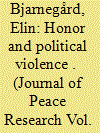

|
|
|
|
|
| Summary/Abstract |
Who participates in political violence? In this study, we investigate the issue at the micro-level, comparing individuals who have used violence in political uprisings with those who have not. We develop our argument from the observation that men are strongly overrepresented in political violence, although most men do not participate. Literature on masculinities emphasizes the role of honor and its links to different forms of violence, such as domestic abuse, criminal violence, and violent attitudes. Building on this literature, we discern two separate but related aspects of honor: honor as male societal privilege and control over female sexuality, that is, patriarchal values, and honor as ideals of masculine toughness, that is, the perceived necessity for men to be fierce and respond to affronts with violence or threats of violence in order to preserve status. We argue that patriarchal values combined with ideals of masculine toughness together constitute honor ideology, which contributes in turn to the explanation of who participates in political violence. We present new and unique individual-level survey data on these issues, collected in Thailand. We find that honor ideology strongly and robustly predicts a higher likelihood of participating in political violence among male political activists. A number of previous studies found a macro-level relationship between gender equality and peacefulness in a society. This study provides evidence for one micro-level mechanism linking gender equality and political violence at the macro level. Based on these results, we conclude that honor ideology endorsement is a driver of violence in political conflicts.
|
|
|
|
|
|
|
|
|
|
|
|
|
|
|
|
| 3 |
ID:
156658
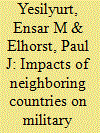

|
|
|
|
|
| Summary/Abstract |
Using the latest spatial econometric techniques and data pertaining to 144 countries over the period 1993–2007, this article tests and compares four frequently used spatial econometric models and eight matrices describing the mutual relationships among the countries, all within a common framework, which helps clarify the impact of neighboring countries on military expenditures. Furthermore, it utilizes two different data sources. Due to this setup, it provides one of the most thorough spatial analyses of military expenditures so far. Furthermore, it confirms but also challenges the results of several previous studies. Military spending measured as a ratio of GDP in one country indeed depends primarily on the spending of other countries, but in a limited number of cases, it also depends on control variables that can be observed in other countries, among which are the level of GDP, the occurrence of international wars, and the political regime. The most likely specification of the matrix describing the relationships among countries is the first-order binary contiguity matrix based on land or maritime borders, extended to include two-sided relationships among the five countries that are permanent members of the UN Security Council and one-sided relationships to all other countries. Finally, cross-sectional approaches are rejected in favor of dynamic spatial panel data approaches due to their controls for habit persistence, country, and time-period fixed effects.
|
|
|
|
|
|
|
|
|
|
|
|
|
|
|
|
| 4 |
ID:
156660
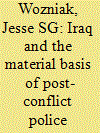

|
|
|
|
|
| Summary/Abstract |
Existing scientific literature on post-conflict police reconstruction is largely divided between two camps. The first, and most widely employed in practice, can be termed a neo-liberal model, which argues progress comes through technological and organizational sophistication delivered by Western officials. This neo-liberal model has been the guiding principle of the reconstruction of the Iraqi state and police force. However, many scholars have argued this model is woefully inadequate for post-conflict reconstruction and have instead developed an alternative approach which can be termed a reflexive model. Similar to what is known as fourth generation peacebuilding in the International Relations literature, the reflexive model stresses building relationships with local stakeholders and relying on indigenous knowledge to guide post-conflict reconstruction. Drawing from 48 intensive interviews, 87 qualitative surveys, and six months of ethnographic examination of an Iraqi police training academy, this article argues that both the neo-liberal and reflexive models suffer from ignoring the material basis of reconstruction. This article employs the term ‘material’ in the theoretical sense; while police reconstruction programs spend significant effort on reshaping the ideologies of police, few address the real conditions police face, from the necessary levels of funding and equipment in their training centers, to basic concerns such as adequate pay to draw qualified applicants and prevent corruption. This study examines how economic inequality affects the ‘other side’ of conflicts, the security sector. The central finding is that the material deprivation experienced by Iraqi police has resulted in an underqualified force consisting of uninterested officers whose capacity and skill deficits have fed directly into the rise of powerful non-state organizations such as the Islamic State. This article explicates a central underlying cause of the problem with the reconstruction of the Iraqi police specifically and the larger case of neo-liberal post-conflict police reconstruction generally.
|
|
|
|
|
|
|
|
|
|
|
|
|
|
|
|
| 5 |
ID:
156662


|
|
|
|
|
| Summary/Abstract |
Existing work has shown that membership in intergovernmental organizations (IGOs) can, among other outcomes, reduce conflict, promote democratization, and shape crisis bargaining. The traditional approach to studying how IGOs can reduce conflict has focused on the effects of dyads’ direct ties to IGOs. In doing so, these analyses use fairly simple counts of the number of IGOs to which the states in each dyad share membership. We argue that this approach is too narrow; we instead consider the effects of higher-order groupings within the IGO network, which we call IGO clusters. Within these IGO clusters, states share relatively many IGO connections with each other, both directly and through indirect links through third parties, fourth parties, and so on. The effects of indirect IGO ties are especially important within such structures. We use a modularity maximization approach to detect clusters within the IGO network. We find robust empirical support for our hypothesis that the pacifying effect of IGO membership stems from the extent to which pairs of states are more deeply embedded within the wider IGO network. Indeed, we find that once we account for states’ shared membership in clusters of IGOs, the simpler dyadic measure of shared IGO membership no longer shows evidence of a conflict-inhibiting effect.
|
|
|
|
|
|
|
|
|
|
|
|
|
|
|
|
| 6 |
ID:
156659
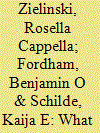

|
|
|
|
|
| Summary/Abstract |
Do considerations that cause military spending increases symmetrically cause spending cuts? Models of military spending that estimate a single effect for major independent variables implicitly assume that this is the case. In reality, the mechanisms that cause military spending increases do not always imply symmetrical cuts, and vice versa. This article examines two considerations widely held to influence military spending: economic growth and international threats. In both cases, there are reasons to suspect asymmetric effects on military spending. While recessions always create pressure for cuts in military spending, which frequently constitutes a substantial share of national budgets, economic growth does not necessarily imply a symmetric need for spending increases. Similarly, while national security policymakers, including the military, are likely to call for spending increases when international threats worsen, they have self-interested reasons to minimize the budgetary implications of declining threats. A cross-national analysis of military spending since World War II shows that economic decline has a larger impact on military spending than economic growth. In regards to international threat, the findings are more complex. There is no evidence that international threat is related to changes in military spending in the short run, and little evidence of a long-run relationship. The threat variables appear to account for cross-sectional variation in military spending but not variation within each state over time. These results suggest military budgets require more time to recover from economic decline than benefit from economic growth as recessions can thus produce long deviations from the equilibrium relationship between the size of the economy and the military budget. This finding in military spending suggests consequences for our understanding of balance of power and power transitions.
|
|
|
|
|
|
|
|
|
|
|
|
|
|
|
|
| 7 |
ID:
156661
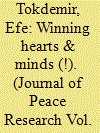

|
|
|
|
|
| Summary/Abstract |
Foreign aid is a policy tool implemented with the purpose of fostering both hard and soft power abroad. Yet, previous research has not probed the effects of US foreign aid on public attitudes toward the US in the recipient countries. In this article, I argue that US foreign aid may actually feed anti-Americanism: aid indirectly creates winners and losers in the recipient countries, such that politically discontented people may blame the US for the survival of the prevailing regime. Drawing on Pew Research for Global Attitudes and on USAID Greenbook datasets, I focus on determining both the conditions under which foreign aid exacerbates anti-Americanism and the type of aid most likely to do this. The findings reveal that political losers of the recipient countries are more likely to express negative attitudes toward the USA as the amount of US aid increases, whereas political winners enjoy the results of US aid and view the USA positively accordingly. Moreover, the effect of US aid on attitudes toward the USA is also conditional on the regime type. While US aid increases the likelihood of anti-American attitudes among the losers in non-democratic countries, it decreases the likelihood of anti-Americanism among the losers in democratic ones. This article has important implications for policy in terms of determining how and to whom to provide aid in the context of the possible ramifications of providing aid at the individual level.
|
|
|
|
|
|
|
|
|
|
|
|
|
|
|
|
|
|
|
|
|